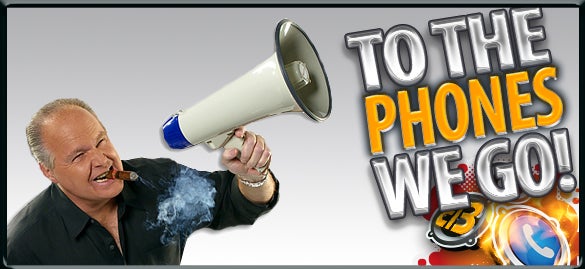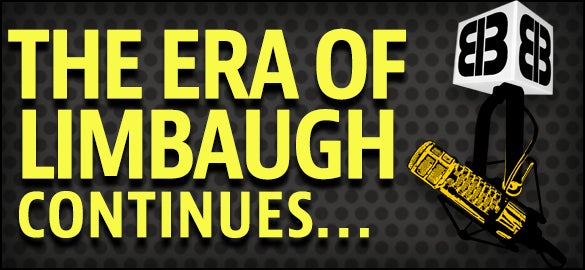RUSH: Michael in New York City. Welcome. Great to have you with us, sir. Hi.
CALLER: Hi, Rush. I want to say thank you again for taking my call. It’s been a pleasure. I’ve been listening for years, and the one thing I realized over the last year is that I actually started to hear you. And I think that’s what the listeners need to do; they need to start hearing you. Planned Parenthood was an example of it. And I think that you’ll continue to educate them if they just hear what you’re saying, not just listen, but hear it. It has substance. I mean, the information’s been great over the years, but, again, they need to start focusing on the hearing side of it and take it a step further than just the words.
RUSH: This is intriguing. Are you a regular listener or —
CALLER: I have been. I started about eight or nine years ago. For a while I had turned off and come back, but for personal reasons, it had nothing to do with the content. But I will say that for the last — definitely for the last three or four years it’s been a constant, and over the last year I see, it’s kind of like that whole premise of thinking outside the box.
RUSH: Yeah?
CALLER: And I think that if the audience were to start doing that — and this is for both sides, both the Democratic and the Republican side —
RUSH: Let me ask you a question about that.
CALLER: Sure.
RUSH: I know you’re not insulting or criticizing, I know it is the exact opposite. But let me ask you, am I making it tough for people to, quote, hear me? Is it too complicated —
CALLER: No, I —
RUSH: — too in-depth? What is it?

RUSH: Oh.
CALLER: — I think that’s a huge part of it, but I think that —
RUSH: That I’m a racist, sexist, bigot, homophobe —
CALLER: No, absolutely not.
RUSH: No, but they think that. They arrive here thinking that, so they listen to the program with that thought, or those thoughts, so they’re then not able to really hear what I am saying.
CALLER: But there’s one difference here. Let’s compare you, in essence, to Karl Rove. You do not have an agenda. Karl Rove has an agenda. There’s a big difference there. And if the audience realizes that, again, all sides of the aisle, you’re not a guy that’s out here to benefit in any way because you want power, because you want political prestige. You’re gonna make the same kind of money you get because, in essence, there’s kind of an entertainment factor to it, but it’s massively informative. And that’s all it is. Guys like Karl Rove, they’re pushing an agenda, period. That’s what they want; that’s what they see the country as, it’s their way or the highway and they will absolutely look to defraud anybody who is not of their same thought process.
RUSH: Okay. I get what you mean. I know what you mean. A lot of people would think I have an agenda, which I actually do have an agenda, but my agenda is within the framework of the business I’m in, which is broadcasting. My agenda or definition of success is wholly contained within the bounds of broadcasting, not politics, and you’re comparing me to people like Rove who have a political agenda that they need to succeed before they can be seen as successful.
Now, I get your point. Whereas, my agenda does not require somebody to win an election in order for me to be successful. But I’ve set it up that way. I was the first to tell people, my success doesn’t depend on who wins elections, ’cause I can’t the control that. But I do have an agenda deconstructing the left, informing people what liberalism is, how to spot it, who liberals are, and all that, but still within the confines of the business that I’m in, in broadcasting. Well, look, I appreciate that. I think I know what you mean. People listen but don’t hear.
I think that describes a lot of people, which is why I’ve had a change in philosophy about this program, and I’ve had to beg your indulgence with it, those of you who listen regularly. It used to be — and this is strictly a performance belief — once you do something, you’ve done it, don’t do it again. Don’t be repetitive in that sense because it looks like you’re out of material or you’re phoning it in or whatever.
So if I did something that was funny or made a good point, I would never do it again to avoid the criticism of phoning it in. But I’ve changed that for a lot of reasons. I will repeat points that I have made, because I now know that sometimes people have to hear things multiple times before they get it. And not everybody listens all the time. So there are these constant modifications made within the bounds of the business I’m in that determine how I do this. And you are very shrewd and clever to make the distinction of listening and hearing. I do appreciate it. Thanks very much.
BREAK TRANSCRIPT
RUSH: Boy, has the email been something today. I mean, it comes in here in droves. I would be embarrassed to tell you how many emails. I just hunt and peck. I scan subject lines. I mean, I can’t possibly read it all, and the stuff that I have found today is just over the top in-depth. The email address is ElRushbo@eibnet.us.
Listen to this one. This is about a guy — and I’m stunned by this. I am stunned at this. This email is in regard to the guy who called about a half hour ago who told me that he’s been a listener, solid listener for the last, what, eight or nine years, or five or six, whatever it was, and he thinks a lot of people listen, but not enough really hear. He was talking about the difference in listening and hearing and how people ought to make a greater effort to actually hear.

“The two are not inconsistent. That is, while your goal is broadcast success, you would never betray your principles or your audience to achieve it, and you don’t have to anyway. But what I think this caller was saying is, you might have an agenda both in broadcast ratings and in pushing the political ideas you believe in, but you can be trusted because you don’t have a personal political agenda. Yours is philosophical. You care about the country, but your income doesn’t depend on you tailoring your message to advocate a certain viewpoint. You’re not a political hack, in other words.
“You are a above that fray and thus your audience trusts your sincerity but outside-the-box commentary and analysis. The outside-the-box observation is one of the most insightful things he said because he’s saying that you are free because of your unique position and your character actually to think and comment freely, thus you see things that others with conflicts of interest and agendas don’t see, and you benefit your audience uniquely by sharing them. Hell, I understand what the guy was saying better than even he does.” (laughing)
Now, that is deep. And that’s from a listener. He ends by saying: “You say you know Trump. Well, I know you.” That’s how he ends it. Look, I don’t want to go through all that point by point, but there’s a lot of truth in that. The primary thing I think he’s concerned about, he thinks that when I tell you that my interests and success here have to do within the broadcast community, he thinks that you might think that I will do whatever it takes to achieve broadcast success, even say things I don’t believe. And he doesn’t want people to get that impression. Which I have addressed countless, countless times here.
You know, I’ve often said that this program is a combination of two things that you don’t see anywhere else. One is the serious, honest, in-depth discussion of ideas combined with off-the-wall, irreverent humor, satire, and parody, both sides with credibility. And you don’t find this. For example, the old Nightline days. If Ted Koppel opened his show with a joke monologue people would say, “What is this? That’s not why I’m tuned in here,” and you’d be nervous.
If Johnny Carson ever threw the monolog out and really did nothing but tell you what he thinks about things you’d think you’re watching ESPN and you’d cancel your subscription. ESPN’s a good example. They can’t do both. They’re trying to combine sports with their ultra-left-wing radicalism, and it isn’t working.


